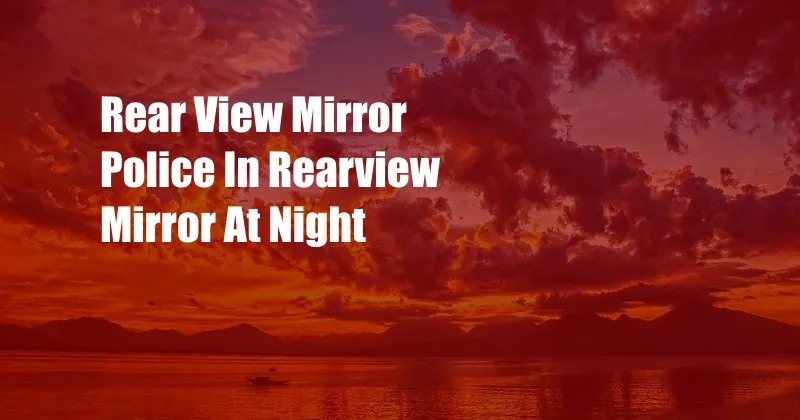
Rear-View Mirror Blues: Police in Your Mirror at Night
Driving at night can be a nerve-wracking experience even in the best of times. But what happens when you spot a pair of flashing lights in your rear view mirror? It’s a heart-pounding moment that can leave you feeling anxious and uncertain.
Whether you’re a seasoned driver or a novice behind the wheel, encountering a police officer during a nighttime drive is an experience that can raise doubts. In this article, we’ll delve into the world of rearview mirror encounters, exploring the reasons behind police presence during nighttime hours, tips on how to handle interactions, and ways to minimize anxiety associated with such situations.
Why Do I See Police in My Rearview Mirror at Night?
There are several reasons why you might see a police officer in your rearview mirror at night:
- Traffic Enforcement: Nighttime is often a period of increased traffic violations, such as speeding, reckless driving, and impaired driving. Police officers are typically more visible during these hours to deter such behavior.
- DUI Checkpoints: During nighttime hours, police often set up DUI checkpoints to identify and apprehend drivers under the influence of alcohol or drugs.
- Patrol and Surveillance: Police officers also conduct routine patrols at night to deter crime and maintain public safety.
Understanding the Nighttime Enforcement Perspective
It’s important to remember that police officers are not looking to harass or intimidate drivers. Their primary goal is to ensure the safety of all motorists and pedestrians. When an officer pulls you over at night, it’s usually for a legitimate reason, such as:
- Traffic Violations: The officer may have observed you committing a traffic violation, such as speeding or failing to signal.
- Suspicious Behavior: The officer may have noticed something unusual about your driving or vehicle that warrants further investigation.
- Safety Concerns: The officer may be concerned about your safety or the safety of others if they believe you are impaired or driving recklessly.
Tips for Handling Nighttime Police Encounters
If you’re ever pulled over by a police officer at night, it’s crucial to remain calm and cooperative:
- Pull Over Safely: When you see the police lights behind you, signal and pull over to the side of the road as soon as it’s safe to do so.
- Stay in Your Vehicle: Unless instructed otherwise, remain inside your vehicle with your hands visible on the steering wheel.
- Be Polite and Respectful: Even if you’re feeling nervous, be polite and respectful to the officer. Explain your actions clearly and honestly.
- Provide Documentation: If asked for your license, registration, or proof of insurance, retrieve them promptly and hand them to the officer through the window.
- Don’t Admit Fault: While it’s important to be cooperative, you should not admit to any wrongdoing unless you’re certain you’re guilty.
Minimizing Anxiety During Nighttime Encounters
If you find yourself feeling anxious during a nighttime encounter with the police, here are some tips to help you cope:
- Breathe Deeply: Take slow, deep breaths to calm your nerves and reduce anxiety.
- Focus on the Present: Don’t dwell on the past or worry about the future. Instead, focus on the present moment and the interaction with the officer.
- Trust Your Instincts: If you feel uncomfortable or unsafe, trust your instincts and call 911 or a trusted friend or family member.
Frequently Asked Questions (FAQs)
Q: Can I refuse to pull over at night?
A: No. It is illegal to refuse to pull over when signaled by a police officer. If you fail to stop, the officer may initiate a pursuit, which can lead to dangerous consequences.
Q: What should I do if I’m pulled over for a DUI?
A: If you’re pulled over for a DUI, it’s important to cooperate with the officer and follow their instructions. Do not attempt to drive away or resist arrest. You have the right to refuse a breathalyzer test, but doing so may have legal consequences.
Q: Can I get a ticket for driving with my headlights off at night?
A: Yes. In most jurisdictions, it is illegal to drive with your headlights off at night. Headlights help you see and be seen, especially in low-light conditions.
Conclusion
While encountering a police officer in your rearview mirror at night can be a nerve-wracking experience, it’s important to remember that they are there to ensure the safety of all motorists. By understanding the reasons behind police presence during nighttime hours, following tips for handling interactions, and practicing anxiety-reducing techniques, you can navigate these situations with confidence and minimize any associated stress. If you’re ever unsure about anything, don’t hesitate to ask the officer for clarification. Stay safe and drive responsibly!
Are you interested in learning more about dealing with police encounters during nighttime hours? Share your questions or experiences in the comments below.